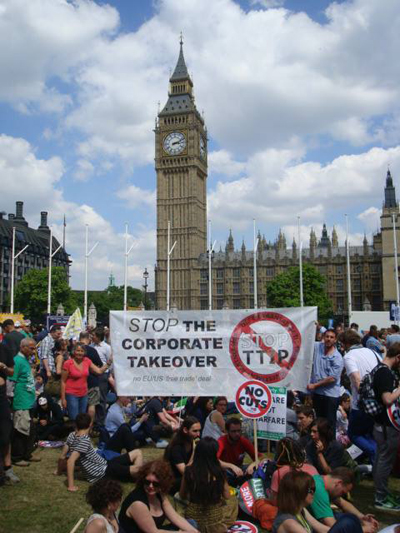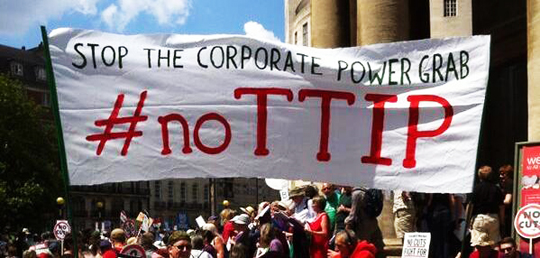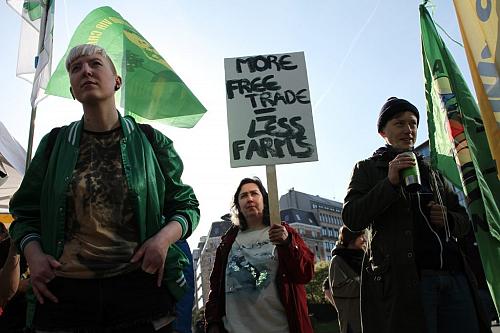Building opposition to free trade agreements is not always easy in Britain. As a small island nation, trade has dominated our history. Britain was also uniquely placed to make ‘free’ trade work in its own interests by the wholesale exploitation of its colonies during the days of empire. As a result of the prosperity that this exploitation delivered over the centuries, there is far less instinctive resistance to the free trade agenda in Britain than in some other European countries.
The Transatlantic Trade and Investment Partnership (TTIP) is changing all that. There is now a growing body of awareness in Britain that these secret negotiations between the EU and USA go way beyond the remit and ambition of traditional free trade agreements. And with this growing awareness comes the realisation that TTIP, if we allow it to go ahead, would represent the greatest transfer of power to transnational capital that we have seen in a generation.

Previous free trade agreements have primarily sought to lower border tariffs to merchandise trade between countries. By contrast, TTIP explicitly aims to reach behind the border into the public policy space of sovereign states, attacking ‘non-tariff barriers’ that prevent transnational corporations from maximising the profits available to them from trade and investment. Both EU and US officials have repeatedly confirmed that their main agenda in TTIP is to remove these regulatory ‘barriers’, an exercise which will unlock millions of dollars in benefits to their corporate friends.
Yet in reality, these ‘barriers’ include some of our most prized social and environmental standards. Corporate lobbyists have identified food safety standards, labour rights, financial safeguards, controls on toxic chemicals and the EU ban on genetically modified organisms as examples of the sort of regulations they would like to see removed or diluted through TTIP. And with negotiators demanding unprecedented powers for transnational corporations to sue sovereign states by means of an investor-state dispute settlement mechanism in TTIP, the scene will be set for a frontal assault on democracy both sides of the Atlantic.
As a result of growing awareness of the threat posed by TTIP, political activists from across Britain are now joining in a broad-based movement to reject the agreement. At War on Want we are being contacted on a daily basis to provide speakers and materials for groups around the country keen to know more about TTIP and the dangers it would bring. The briefing on TTIP that we have produced with the Rosa Luxemburg Foundation (now available in seven European languages) has been flying out of our office in such numbers that we need to reprint it already. Even with minimal interest from the mainstream media in Britain, this is an issue which is fast rising up the political agenda.
The movement consists of activists from across the spectrum. Anti-capitalist campaigns groups such as War on Want have long warned of the dangers of free trade agreements, and we have joined forces with the World Development Movement, Friends of the Earth and other civil society organisations to draw public attention to the threat that TTIP poses. Anti-fracking groups, Occupy activists, food sovereignty campaigners and members of the People’s Assembly Against Austerity are all joining the resistance. There has been particular interest from local movements working to protect Britain’s precious National Health Service, who rightly see the risk of irreversible services liberalisation at the hands of TTIP.

The trade union movement in Britain is also heavily engaged. UNISON, the public sector union that represents 1.3 million workers, is a leading player in the campaign against TTIP, and has produced its own briefing to outline its opposition. The teaching unions are also building the resistance, including both the National Union of Teachers (NUT) and the University and College Union (UCU), which passed a motion condemning TTIP at its conference just last month. The Public and Commercial Services Union (PCS), which represents civil servants, has also joined the opposition.
Nor is it just the public sector trade unions that have come out against TTIP. Britain’s third largest union, the GMB, represents over 600,000 workers, many of them from the manufacturing sector. It too has joined the campaign against TTIP, and its general secretary has signed a joint letter with other union leaders calling for TTIP to be halted. This goes alongside parallel calls to stop the TTIP negotiations from trade union federations in countries such as Germany, France and Spain, representing millions of European workers between them.
The threat from TTIP touches all sectors of society, and that is why we will defeat it. When the countries of the OECD tried to introduce the same powers for transnational corporations through the Multilateral Agreement on Investment, a worldwide movement rose up in opposition to it and the attempt was abandoned. The EU then tried to achieve the same end by expanding the negotiating agenda of the World Trade Organisation (WTO) to include the issues of investment, public procurement and competition policy as part of the new Doha Round of world trade talks launched in 2001. Again the issues were thrown off the negotiating table, and the WTO has never recovered from the loss of credibility caused by this embarrassing defeat.
Our victory will come from a concerted, united response to TTIP, and we are building that response in Britain as in the rest of Europe and the USA. Together with the Rosa Luxemburg Foundation, UNISON, World Development Movement and other groups, War on Want is running a national No TTIP speaking tour on 8-10 July, leading up to the first national day of action against TTIP on 12 July. Following successful hustings on TTIP prior to the European elections, we are preparing to contact all UK MEPs in the new European Parliament and to press them to join the movement against TTIP. We are also looking ahead to next year’s general election in Britain, when we hope to make TTIP an issue for all parliamentary candidates seeking our votes.
We have much work to do if we are to turn an EU-US free trade agreement into a key political battleground. But there is no shortage of energy and commitment in the anti-TTIP movement here in Britain, and we are ready for the fight.
John Hilary (War on Want) [1]
This op-ed has been translated in French here.








